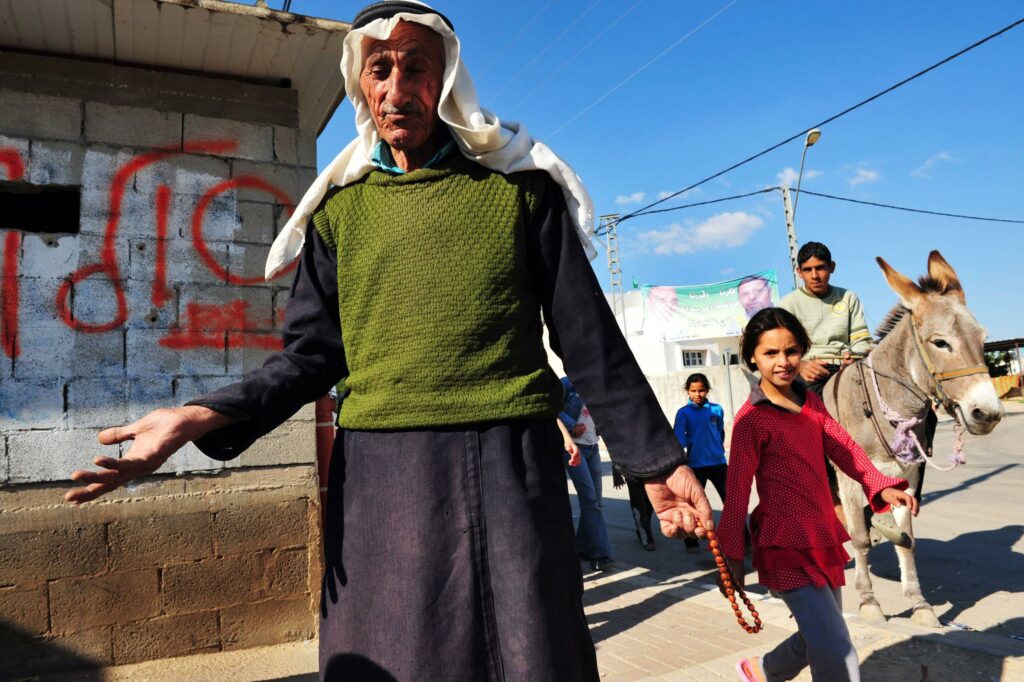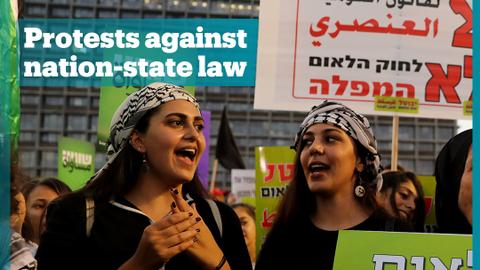Professor Emerita Pauline Kollontai

Since its foundation in 1948 the State of Israel has faced significant challenges as a Jewish and Democratic State within its own society as regards its minority communities and the conflict with the Palestinian people. Declaring a state as a democracy and identifying with a specific religion is bound to present complexities in government decision making and policies; religion and democracy are diverse and multifaceted in terms of concept and practice. The quintessential starting point of the democratic concept is recognition of the fundamental worth and dignity of every person and respect for their equality. The four essential elements of a democracy include two that are specifically intended to do this: the protection of the human rights of all citizens and particular rights of minority communities; and a rule of law that applies equally to all citizens. However, democratic systems vary in the practice of these two elements for several reasons that can dilute the importance of recognising and upholding worth, dignity and equality of every person. At the core of religions are the principles of justice, freedom, and peace, but as history demonstrates these principles are not always applied in practice. They are sometimes either forgotten, neglected, or overwhelmed by the content of religious teachings that undermine these principles. A combination of a state that neglects or interferes with the starting point of the democratic concept, and religious establishments and communities who either proactively undermine the principles of justice, freedom and peace contained in their tradition, or remain silent as these principles are violated by governments, results in a situation where rights and dignity are diminished or virtually non-existent.
The research I have undertaken since 2017 on minority rights in Israel examines the complexities and challenges concerning the active promotion and protection of these rights. The concept of rights per se are present in the ethical principles and values of the Jewish tradition found especially in the biblical teachings of Ve’ahabhath le-Re’akha (love of neighbour) and Va’ahavtem et ha-Ger (love the stranger). My research draws on a wide range of academic writings, official Israeli state and government reports and documents, debates in Knesset, independent reports from non-government organisations within Israel and internationally, media reports, and field research.
The backdrop to this research has been the ongoing deterioration in Israel as a democracy, the growth of an illiberal political ideology, and rise of Jewish religious extremism seen in Israel since the mid-1990s, especially since 2009. By looking in detail at the political, legal, religious, and social discourses in contemporary Israel and then applying these to the case of two minority communities in Israel – the indigenous Bedouin of the Negev, and the Ethiopian Jewish community – my research illustrates the growth and intensification of discrimination and inequality in the everyday life of both these communities because of these political and religious changes.
This research confirms that Israel’s claim to be a democracy is indeed true theoretically, but not always in practice. The failure of Israel as a Jewish and democratic state is its inconsistent approach in promoting and protecting the rights of all its citizens; clearly evidence in this research. This is partly due to religious and political interpretations of aspects of the Jewish tradition which are claimed to put the chosen people and their needs above all others. It is also a by-product of the fusion of an extreme, exclusivist religious perspective and a form of nationalism that promotes the superiority of one people over others. As a result, a powerful force has been created that has the capacity to destabilise if not destroy democracy in Israel and those constructive aspects of the Jewish religio-cultural legacy perceived to complement democracy. Since 1948 there have been Israeli governments who have pursued a more liberal model of democracy, for example in the 1980s and 1990s under the leadership of Shimon Peres, Yitzhak Rabin, and Ehud Barak. This demonstrates that in the Israeli body politic there are fluctuations in the interpretation and practice of democracy within the dominant concern of protecting and sustaining Israel as a Jewish homeland.

No democracy, in all its variations across the globe, can be perfect and sometimes such states may stray from the democratic model to which they aspire. But there is a significant difference between a democracy that may occasionally do less to uphold these principles (perhaps due to the complexities of national and international geo-political context and economic crisis, war and conflict, or an unprecedented public health) and a democracy that has a long and significant track record of policies, actions, and inactions that infringe, disregard, or violate these principles.
What are the future prospects of establishing justice for all Israel’s minority communities and providing them with an equal sense of belonging as full and equal citizens of Israel? I argue that the answer is at best mixed. There were signs of hope in the 1990s with the passing of the two Basic Laws dealing with aspects of human rights. This, for the first time, enshrined the beginnings of a Bill of Rights and gave rights a semi-constitutional status. The way in which some in the Israeli Supreme Court initially promoted the status of these two Basic Laws, on occasions using it to protect human rights in relevant legal cases, indicates some progress. Also, the 2003-2006 work on a draft constitution in which issues of minority rights were taken into account, is a sign of hope.
However, since 2009, under coalition governments of the right, this constitutional revolution has been halted. Based on the past two decades of what has occurred in Israel with the significant shift to the political right, the influence of the religious right, and the loss of influence of those in the political centre and left, the future for the Negev Bedouins and the Ethiopian Jewish communities, along with other minority communities, looks bleak. But there is reason for cautious optimism on several fronts.
 Throughout the seven decades of Israel’s existence there are examples of attempts by government ministers, members of the judiciary, and state officials, to address the discrimination and inequalities that both Negev Bedouin and Ethiopian Jews face. This suggests that there is not a total blindness or indifference to these communities within the official sectors. Recent examples of the Goldberg Commission (2011), the 2008 and 2013 reports of the State Comptroller and the Palmor Commission (2016) demonstrate this and show the willingness of these officials and judiciary to publicly criticise government failures and publish their findings and recommendations. There is also the essential work and advocacy of Israeli civil society (secular and religious-based) human/civic rights organisations (e.g., RHR, B’Tselem, NCFCE, Adalah) who monitor, critique, and publicly report on the ineffective and inadequate response of governments and state authorities. Their work is intended to challenge government, state, and judiciary and to continue to promote awareness and understanding amongst the public. On rare occasions, religious leaders of the religious Orthodox and Haredi communities, including Chief Rabbis, have been known to make statements that recommend that the government addresses weaknesses and inadequacies of official policy towards minorities in general. Certainly, there are some media outlets that are forthright in their criticism of government. Similarly, there are some Israeli academics who do not draw back in their critique of policy and practices. There are also educational professionals who are endlessly trying to educate children and young people that discrimination and hatred of those seen as ‘the other’ is wrong and not acceptable. Finally, there are Israeli Jewish members of the public (religious and secular) who, at grass roots, stand alongside the Negev Bedouin and Ethiopian Jews in their fight for justice and to be treated as other Israeli citizens. At least the voices and work of all these groups, organisations, and individuals show that within Israel there remains a moral conscience concerning the treatment of minority communities. Whether this moral conscience is because of religious belief or not, it does reflect and express the prophetic teachings of justice, peace, and freedom on which the State of Israel was founded in 1948 and demonstrates that the Jewish ethical teachings of Ve‘ahabhath le-re’akha (love of neighbour), and Va’ahavtem et ha-Ger (love the stranger) continue to be present in Israel.
Throughout the seven decades of Israel’s existence there are examples of attempts by government ministers, members of the judiciary, and state officials, to address the discrimination and inequalities that both Negev Bedouin and Ethiopian Jews face. This suggests that there is not a total blindness or indifference to these communities within the official sectors. Recent examples of the Goldberg Commission (2011), the 2008 and 2013 reports of the State Comptroller and the Palmor Commission (2016) demonstrate this and show the willingness of these officials and judiciary to publicly criticise government failures and publish their findings and recommendations. There is also the essential work and advocacy of Israeli civil society (secular and religious-based) human/civic rights organisations (e.g., RHR, B’Tselem, NCFCE, Adalah) who monitor, critique, and publicly report on the ineffective and inadequate response of governments and state authorities. Their work is intended to challenge government, state, and judiciary and to continue to promote awareness and understanding amongst the public. On rare occasions, religious leaders of the religious Orthodox and Haredi communities, including Chief Rabbis, have been known to make statements that recommend that the government addresses weaknesses and inadequacies of official policy towards minorities in general. Certainly, there are some media outlets that are forthright in their criticism of government. Similarly, there are some Israeli academics who do not draw back in their critique of policy and practices. There are also educational professionals who are endlessly trying to educate children and young people that discrimination and hatred of those seen as ‘the other’ is wrong and not acceptable. Finally, there are Israeli Jewish members of the public (religious and secular) who, at grass roots, stand alongside the Negev Bedouin and Ethiopian Jews in their fight for justice and to be treated as other Israeli citizens. At least the voices and work of all these groups, organisations, and individuals show that within Israel there remains a moral conscience concerning the treatment of minority communities. Whether this moral conscience is because of religious belief or not, it does reflect and express the prophetic teachings of justice, peace, and freedom on which the State of Israel was founded in 1948 and demonstrates that the Jewish ethical teachings of Ve‘ahabhath le-re’akha (love of neighbour), and Va’ahavtem et ha-Ger (love the stranger) continue to be present in Israel.
These examples are the basis for cautious optimism. Changes on the part of the Israel government enable it to fulfil the four key responsibilities essential to the rights of minorities: (i) Protection of their survival and existence; (ii) promotion and protection of the identity of minorities; (iii) ensuring equality and non-discrimination; (iv) and effective and meaningful participation of minorities in all sectors of society (UNHRHC 2010). However, this optimism may be curtailed given the formation of a new Israeli coalition government on May 3, 2021, between eight political parties from the left to the far right, including the membership of a small Arab party called Raam. For the first two years, this government will be led by Naftali Bennett, described as an ultra-nationalist who opposes a Palestinian state and advocates the annexation of the majority of the occupied West Bank. Then, between 2023 -2025, Yair Lapid, a centrist politician will take over the leadership. Will this new government survive more than a few months? Or will the people of Israel face its fifth general election in just over four years?
This research will be published as a book in 2022.